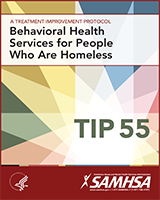NCBI Bookshelf. A service of the National Library of Medicine, National Institutes of Health.
Excerpt
This Treatment Improvement Protocol (TIP) is for you, the behavioral health service provider or program administrator who wants to work more effectively with people who are homeless or at risk of homelessness and who need, or are currently in, substance abuse or mental health treatment. The TIP addresses treatment and prevention issues. Some aspects of the TIP will be of primary interest to counselors across settings, whereas others will be of primary interest to prevention professionals or providers in primary care settings. However, the approach advocated by the TIP is integrated and is aimed at providing services to the whole person to improve quality of life in all relevant domains.
Contents
- Consensus Panel
- What Is a TIP?
- Foreword
- How This TIP Is Organized
- Part 1. A Practical Guide for the Provision of Behavioral Health Services
- Part 2. An Implementation Guide for Behavioral Health Program Administrators
- Part 2, Chapter 1
- Introduction
- Developing Services for Clients Who Are Homeless
- The Housing First Approach
- Challenges in Adapting Programs To Address the Needs of People Who Are Homeless
- Modifying Behavioral Health Services To Meet the Needs of Clients Who Are Homeless
- Interacting With Community Resources To Build a Continuum of Care
- Collaborative Partnerships
- Internet Resources
- Integrating Behavioral Health Services With a Community System of Homelessness Services
- Building Linkages Among Services
- Funding Community Homelessness Services
- Part 2, Chapter 2
- Part 2, Chapter 1
- Part 3. A review of the literature
- Appendix A Bibliography
- Appendix B Advisory Meeting Panel
- Appendix C Stakeholders Meeting Participants
- Appendix D Field Reviewers
- Appendix E Acknowledgments
This publication was produced under contract number 270-09-0307 by the Knowledge Application Program (KAP), a Joint Venture of The CDM Group, Inc., and JBS International, Inc., for the Substance Abuse and Mental Health Services Administration (SAMHSA), U.S. Department of Health and Human Services (HHS). Christina Currier served as the Contracting Officer’s Representative.
Suggested citation:
Substance Abuse and Mental Health Services Administration. Behavioral Health Services for People Who Are Homeless. Treatment Improvement Protocol (TIP) Series 55. HHS Publication No. (SMA) 13-4734. Rockville, MD: Substance Abuse and Mental Health Services Administration, 2013.
The opinions expressed herein are the views of the consensus panel members and do not necessarily reflect the official position of SAMHSA or HHS. No official support of or endorsement by SAMHSA or HHS for these opinions or for the instruments or resources described is intended or should be inferred. The guidelines presented should not be considered substitutes for individualized client care and treatment decisions.
- NLM CatalogRelated NLM Catalog Entries
- Review Using Technology-Based Therapeutic Tools in Behavioral Health Services[ 2015]Review Using Technology-Based Therapeutic Tools in Behavioral Health ServicesCenter for Substance Abuse Treatment (US). 2015
- Review Addressing Viral Hepatitis in People With Substance Use Disorders[ 2011]Review Addressing Viral Hepatitis in People With Substance Use DisordersCenter for Substance Abuse Treatment. 2011
- Review Trauma-Informed Care in Behavioral Health Services[ 2014]Review Trauma-Informed Care in Behavioral Health ServicesCenter for Substance Abuse Treatment (US). 2014
- Review Treatment for HIV-Infected Alcohol and Other Drug Abusers[ 1995]Review Treatment for HIV-Infected Alcohol and Other Drug AbusersCenter for Substance Abuse Treatment. 1995
- Review Improving Cultural Competence to Reduce Health Disparities[ 2016]Review Improving Cultural Competence to Reduce Health DisparitiesButler M, McCreedy E, Schwer N, Burgess D, Call K, Przedworski J, Rosser S, Larson S, Allen M, Fu S, et al. 2016 Mar
- Behavioral Health Services for People Who Are HomelessBehavioral Health Services for People Who Are Homeless
- SRS7519932 (3)SRA
- SRS3195044 (5)SRA
- photosystem Q(B) protein, partial (chloroplast) [Ribes himalense]photosystem Q(B) protein, partial (chloroplast) [Ribes himalense]gi|32966796|gb|AAP92259.1|Protein
Your browsing activity is empty.
Activity recording is turned off.
See more...
